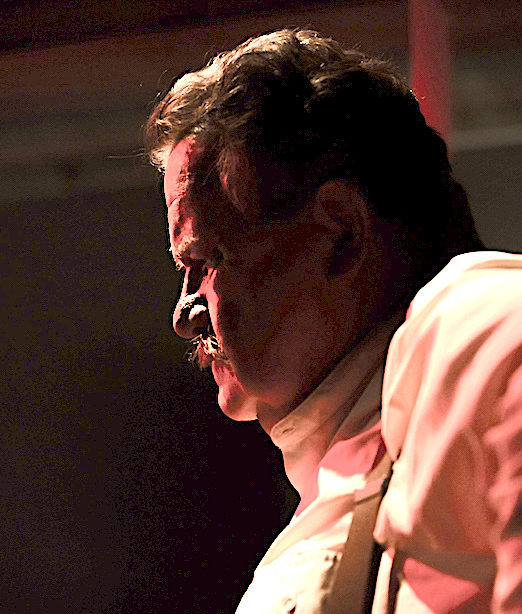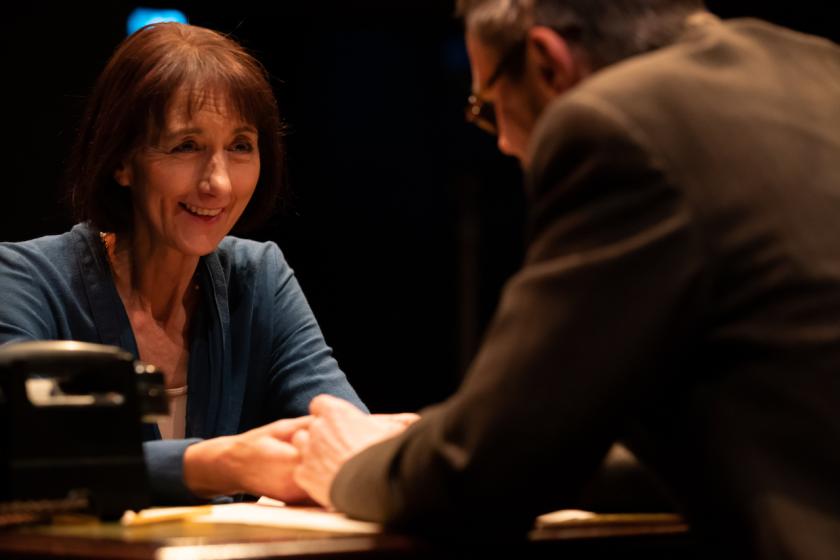How do you begin to dramatise one of the most extraordinary conversations of the 20th century between two of its most charismatic and complex intellectuals? When the philosopher, and then First Secretary at the British Embassy in Moscow, Isaiah Berlin met the Leningrad poet Anna Akhmatova, it proved a transformational experience for both of them, though the political repercussions it had for Akhmatova were devastating.
The playwright Olivia Olsen, whose passing physical resemblance to Akhmatova also allows her to bring her elegantly to life, has made a slightly curious decision. One of the most interesting aspects of Berlin and Akhmatova’s encounter was that the poet was 20 years older than the philosopher. As a result, though Berlin described their 14-hour conversation about everything from Pushkin to life under Stalin as "the most memorable encounter of my life", he denied that he felt anything akin to love. She on the other hand said she felt "as if the sun were in my body" and wrote a series of passionate poems about the man she described as "The Guest From The Future".
Accounts of Akhmatova from 1945, when they met on just that one occasion, describe her as "stately, grey-haired, with a white shawl round her shoulders." Berlin himself, in Personal Impressions, wrote that "she looked and moved like a tragic queen…[I felt] acutely shy and constricted by her distant, somewhat regal manner". So one of the tensions was that while the 35-year-old man was spiritually and emotionally moved by his visit, physically he was not. After that meeting she would see him when she visited Oxford 20 years later, but both for both political and personal reasons they did not meet again in Russia.
It seems, then, to be missing a truly interesting aspect of their "relationship" to merge, as Olsen has done here, Berlin’s character with that of Boris Anrep. Anrep was a respected mosaicist whose work can be seen today at the National Gallery and Westminster Cathedral among other places: he was six years older than Akhmatova and they had an affair which inspired 30 poems.
In Robin Herford’s production, in which the auditorium has been configured so that it feels as if we ourselves are sitting in Akhmatova’s living room, we watch as Ben Porter’s Berlin and Olsen’s Akhmatova reconstruct the immortal encounter. Their conversations are interspersed with Akhmatova’s meetings with Ian Redford’s crude, foul-mouthed Stalin (pictured below), who is desperate to possess Akhmatova’s talent, and sadistically uses her son – Lev, imprisoned in a labour camp – as a bargaining chip.
 There are two key problems with the meetings (which here happen in the plural) that we are asked to witness between Berlin and Akhmatova. Firstly, unlike the real scenario, we are watching two attractive actors with credible physical tension interact with each other, which shouldn’t be a problem but is. Secondly, and rather more concerningly, their conversation, especially in the first half, rarely feels as if it is taking flight. Much too much of it is taken up with explaining, somewhat prosaically, who they are and what they are doing there.
There are two key problems with the meetings (which here happen in the plural) that we are asked to witness between Berlin and Akhmatova. Firstly, unlike the real scenario, we are watching two attractive actors with credible physical tension interact with each other, which shouldn’t be a problem but is. Secondly, and rather more concerningly, their conversation, especially in the first half, rarely feels as if it is taking flight. Much too much of it is taken up with explaining, somewhat prosaically, who they are and what they are doing there.
It is always difficult getting the balance right between conveying a historical figure’s hinterland and convincingly portraying their actions in any given scenario. More difficult still when they both have a reputation for fiery brilliance in their conversation. I interviewed Berlin’s biographer, Michael Ignatieff, at the start of this year, who talked effusively about the impact Berlin had on him – "he was hugely important in making me restrain my Russian gloom, my Russian longing for deep historical meanings, my longing for the warm comfortable bath of consolation." Porter, while charming, just doesn’t convey the depth of a man who in most of his interactions was trying nothing less than to force you to re-examine your entire world perspective.
What we do have here is the unquestionable drama of what happened to Akhmatova as a result of meeting Berlin. Her rooms were bugged, and questions about whether or not Berlin was a spy instantly impacted on Stalin’s treatment of her and her son. Redford is convincingly thuggish as Stalin, while Olsen poignantly conveys the restrained agony of a mother trying to stay loyal to a country fractured by totalitarian brutality.
Yet ultimately that fire of what happens when two strangers meet and have an intense connection that goes beyond the understanding of both is missing. Olsen should have had the courage of her convictions and emphasised all that was distinctive about Akhmatova and Berlin’s interaction, rather than making it more conventional. In the second half, once the explaining is done with, we do start to feel more emotionally engaged, but it is too little too late. It would be interesting to see what Olsen might write if she dared to dig deeper, but right now, you’d be better off reading Ignatieff’s biography to feel the full power of that extraordinary night in Leningrad.















Add comment